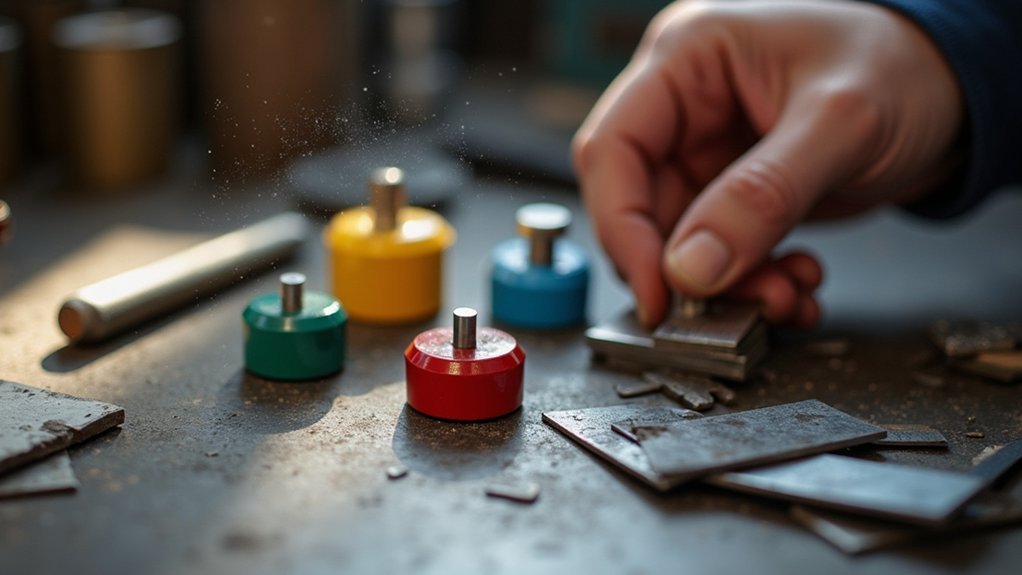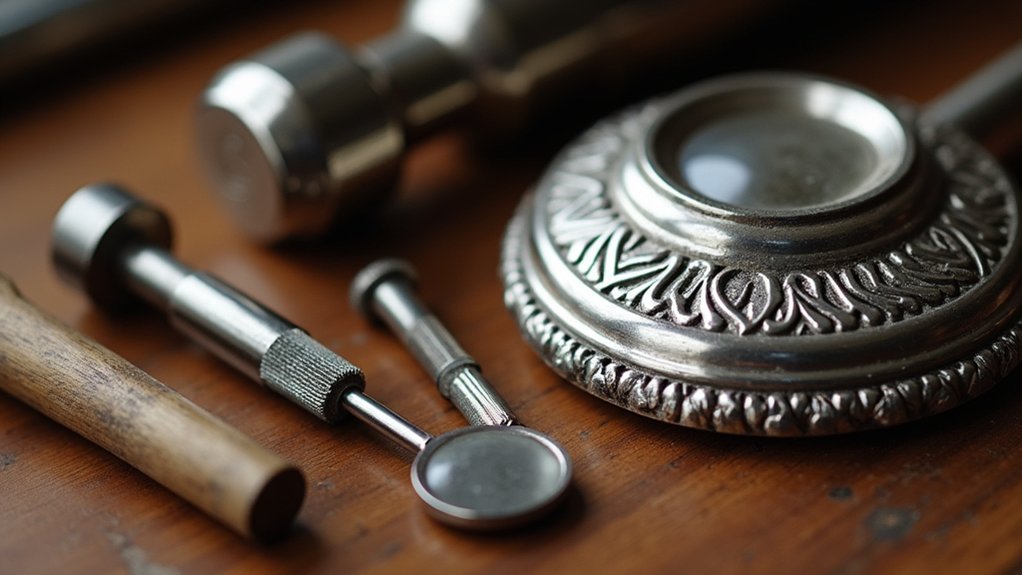You’ve likely encountered that frustrating moment when you can’t tell if a piece of metal is ferromagnetic or not. Whether you’re sorting scrap, authenticating jewelry, or working on DIY projects, having the right testing magnet makes all the difference. A proper metal testing magnet saves you time, prevents costly mistakes, and fits conveniently in your pocket. The market offers various options with different strengths and features—but which ones truly deliver? Let’s explore the top performers that deserve a place in your toolkit.
Keychain Magnet for Testing Metals and Hanging Keys (WELLZEER 2-Pack)
If you’re a jewelry dealer, metal recycler, or antique collector who needs to quickly distinguish genuine metals from fakes, the WELLZEER keychain magnets offer professional-grade testing in a pocket-sized package.
These compact 15x45mm neodymium magnets boast an impressive 8-pound pull force while remaining easily portable. You’ll efficiently identify fake jewelry with steel or nickel bases, distinguish chrome-plated items from silver, and separate genuine brass from plated imitations.
Beyond testing, they’re practical for retrieving dropped keys in urban environments. Each set includes two heavy-duty magnets that conveniently attach to your keychain for immediate access whenever and wherever you need to verify metal authenticity.
Best For: Jewelry dealers, metal recyclers, antique collectors, and everyday users who need to verify metal authenticity or retrieve dropped metal items on the go.
Pros:
- Powerful 8-pound pull force in a compact, keychain-friendly size (15x45mm)
- Effectively distinguishes genuine metals from fakes, including brass, silver, and chrome-plated items
- Includes two heavy-duty magnets per package for convenient everyday carry and practical applications
Cons:
- May be too strong for some delicate applications or around sensitive electronics
- Limited to testing only ferromagnetic metals (iron, nickel, cobalt), not all metal types
- Could potentially damage magnetic strips on credit cards if stored nearby in pockets or purses
BAYTORY 25mm Keychain Magnet for Testing Metals (2Pcs)
Metal collectors and recyclers will appreciate the BAYTORY 25mm Keychain Magnet’s blend of portability and power. This compact 25mm neodymium magnet delivers 10 pounds of pull force while conveniently attaching to your keychain for on-the-go metal testing.
Encased in an A3 steel shell, it’s designed for durability with strong wear and corrosion resistance. You’ll find it particularly useful for identifying metals like brass, gold, and silver—making it ideal for antique buyers, jewelry enthusiasts, and scrappers alike.
With a solid 4.4-star rating from 170 users, it’s proven effective for distinguishing authentic precious metals from imitations.
Best For: Metal recyclers, jewelry collectors, and antique buyers who need a convenient, portable way to quickly test and identify different metals on the go.
Pros:
- Powerful 10-pound pull force in a compact 25mm size that easily attaches to keychains
- Durable A3 steel shell design with strong corrosion resistance for long-term reliability
- Versatile functionality for testing precious metals like gold and silver, making it valuable for verifying authenticity
Cons:
- Some users report wishing for stronger magnetic force for more demanding applications
- At 7.8 ounces, it may be relatively heavy for a keychain accessory
- Limited to magnetic testing only, which doesn’t provide comprehensive metal verification for all types of metals
Keychain Pocket Magnet for Testing Metals and Jewelry
Jewelry dealers and metal enthusiasts will find the keychain pocket magnet an indispensable tool for quickly identifying authentic metals. This super strong pocket-sized tester easily distinguishes genuine items from counterfeits by detecting iron, nickel, or cobalt content.
You’ll appreciate how effectively it reveals fake jewelry where plated metals hide steel or nickel alloy bases. The compact design attaches to your keychain, ensuring you’re always ready to test metals on the go.
It’s particularly valuable when sorting chrome-plated items from silver and aluminum, or when differentiating solid brass and bronze from steel-plated items – perfect for recyclers, antique buyers, and collectors.
Best For: Jewelry dealers, metal recyclers, antique buyers, and collectors who need a portable, reliable way to test and authenticate metals on the go.
Pros:
- Compact keychain design makes it extremely portable for field testing of metals and jewelry
- Quickly identifies fake or plated jewelry by detecting hidden steel or nickel alloy bases
- Effectively differentiates between visually similar metals like chrome-plated items versus silver or aluminum
Cons:
- Limited to detecting only magnetic metals (iron, nickel, cobalt) and cannot identify specific precious metals like gold or platinum
- May give false readings on items with minimal magnetic material content
- No instructions included for interpreting varying degrees of magnetic attraction strength
Mall Keychain Magnet for Testing Precious Metals and Jewelry
Compact and powerful, the Mall Keychain Magnet offers an essential tool for jewelers, recyclers, and coin dealers who need to verify precious metals on the go. This N40 neodymium magnet easily distinguishes gold or silver-plated items from solid precious metals by detecting ferrous base metals.
At just 0.47 × 1.57 inches and weighing only 0.6 oz, it’s remarkably portable while delivering over 2 pounds of pull force. You’ll appreciate how it quickly identifies polished aluminum from stainless steel and reveals plated jewelry. Users consistently praise its strength and convenience, making it a practical addition to your testing toolkit.
Best For: Jewelry enthusiasts, metal recyclers, coin collectors, and professional jewelers who need a portable, reliable way to quickly test precious metals and distinguish genuine gold or silver from plated items.
Pros:
- Extremely portable at just 0.47 × 1.57 inches and 0.6 oz, making it easy to carry on a keychain for testing anywhere
- Powerful N40 neodymium magnet with over 2 pounds of pull force effectively detects ferrous metals in plated jewelry
- Practical tool for distinguishing between similar-looking metals like polished aluminum and stainless steel for industrial recycling purposes
Cons:
- Some users report wanting greater reliability compared to regular magnets for certain testing applications
- Limited to detecting only ferrous metals (iron, nickel, cobalt), so cannot definitively confirm pure gold or silver
- May require additional knowledge or testing methods to fully authenticate precious metals beyond basic magnetic testing
Keychain Magnet Tester for Gold and Precious Metals (2 Pack)
For jewelers and collectors who need a portable verification tool, this keychain magnet tester provides an essential first line of defense against counterfeit precious metals. This 2-pack features powerful N40 neodymium magnets that exert over 2 pounds of pull each.
You’ll appreciate how these compact 0.47 x 1.57-inch testers easily distinguish chrome-plated items from authentic silver or non-magnetic stainless steel. They’re particularly effective for sorting brass and bronze from steel-plated antiques. The durable plated metal shell and stainless steel split ring guarantee longevity while maintaining portability—just 0.6 oz each. Beyond testing, they’re handy for retrieving small metallic items.
Best For: Jewelers, coin collectors, antique dealers, and recycling enthusiasts who need a quick and portable first-level verification method for distinguishing genuine precious metals from counterfeits.
Pros:
- Highly portable keychain design with powerful N40 neodymium magnets that can pull over 2 pounds each
- Effectively distinguishes chrome-plated items from authentic silver, aluminum, and non-magnetic metals
- Serves multiple purposes beyond testing, including retrieving small metallic items and sorting different metal types
Cons:
- Provides only a preliminary test and should be used alongside other verification methods like density or acid testing
- May yield inconsistent results with certain gold and silver alloys that contain varying amounts of magnetic metals
- Small size (0.47 x 1.57 inches) could make it easy to misplace despite the keychain attachment
EISCO Metal Discs Set (16 Pieces) for Magnetic Testing
Science educators and laboratory instructors will find the EISCO Metal Discs Set invaluable for teaching magnetic properties and metal identification. This extensive collection includes 16 discs featuring eight different metals: mild steel, stainless steel, brass, zinc, nickel, bronze, aluminum, and copper.
Each metal type comes as a pair—one labeled and one blank—allowing you to conduct identification exercises with students. The included plastic storage case keeps everything organized and ready for demonstrations.
You’ll appreciate how these discs clearly demonstrate varying magnetic responses across different metals, though be aware that some users have noted occasional labeling inconsistencies in certain sets.
Best For: Science teachers and laboratory instructors looking to demonstrate magnetic properties and conduct metal identification activities in educational settings.
Pros:
- Complete set with 16 discs featuring 8 different metals, providing comprehensive materials for comparative magnetic testing
- Convenient paired design with one labeled and one blank disc for each metal type, ideal for identification exercises
- Includes a plastic storage case for organization and easy transport between classrooms or lab stations
Cons:
- Some users report inconsistencies with disc labeling, which could cause confusion during educational demonstrations
- Limited to only 8 metal types, which may not cover all materials needed for comprehensive metallurgy education
- No accompanying instructional materials or activity guides included with the set
TRYMAG Keychain Magnets for Testing Metals (4 Pack Neodymium)
These powerful TRYMAG Keychain Magnets deliver impressive 17-pound pull strength while remaining small enough to fit in your pocket or wallet. At just 0.47 x 1.69 inches, they’re perfect for identifying fake gold and silver jewelry on the go.
You’ll appreciate their versatility beyond jewelry testing. Use them to reset life alert pendants, detect iron in non-ferrous metals at scrap yards, or organize tools on metal surfaces. The convenient keychain design means you’ll always have a reliable metal tester handy.
Each set includes four magnets in an exquisite protective case, making them both practical and gift-worthy.
Best For: Jewelry enthusiasts, metalworkers, and DIY hobbyists who need a portable and reliable way to test metals and organize small metal objects.
Pros:
- Powerful 17-pound pull strength in a compact size that easily fits in pockets or wallets
- Versatile applications from testing jewelry authenticity to resetting devices and organizing tools
- Comes as a set of four magnets in a protective case, making them durable and gift-worthy
Cons:
- May stick to keys and other metal objects in pockets or bags unintentionally
- Small size could make them easy to misplace if not attached to a keychain
- Limited effectiveness for very large or heavy metal objects due to their compact design
Keychain Magnet for Testing Metals (2 Pack)
When you’re a jewelry dealer, metal recycler, antique buyer, or collector who needs reliable metal authentication on the go, the Keychain Magnet for Testing Metals (2 Pack) offers an ideal portable solution. At just 0.47 x 1.57 inches with 3 pounds of pull power, these compact magnets easily detect iron, nickel, or cobalt in metals.
You’ll quickly identify fake jewelry with steel or nickel bases, differentiate chrome-plated items from silver or aluminum, and distinguish solid brass from plated alternatives. Users praise their strength, discreet size, and versatility—from testing precious metals to retrieving dropped items. They’re small enough for your keychain but powerful enough for professional use.
Best For: Jewelry dealers, metal recyclers, antique buyers, and collectors who need a portable and reliable way to authenticate metals on the go.
Pros:
- Compact size (0.47 x 1.57 inches) with impressive 3-pound pull power makes it highly portable while still effective
- Versatile application for identifying fake jewelry, distinguishing solid brass from plated items, and differentiating between various metals
- Conveniently attaches to keychain for easy access whenever metal testing is needed
Cons:
- Limited to detecting only ferromagnetic metals (iron, nickel, cobalt), so cannot identify all types of fake metals
- Two-pack may be more than casual users need for occasional metal testing
- No included instructions on how to interpret magnetic reactions for different metal types
Heavy Duty Ring Magnets for DIY & Crafts (2 Pack)
For DIY enthusiasts and crafters seeking versatile magnetic solutions, the Heavy Duty Ring Magnets offer exceptional value with their 1.75-inch (44mm) size and central hole design.
These durable ceramic magnets provide consistent magnetic force distribution while their black finish guarantees they blend discreetly into your projects. At $3.99 per pair, you’ll get high-quality strength comparable to automotive-grade magnets.
You’ll find these particularly useful for organizing tools, holding sewing pins, or even knife-making. While they may not support extremely heavy items, their corrosion resistance guarantees long-lasting performance. Just handle with care—their brittle nature means they may chip if dropped on hard surfaces.
Best For: DIY enthusiasts, crafters, and hobbyists looking for versatile, medium-strength magnetic solutions with central holes for mounting or attachment projects.
Pros:
- Durable ceramic construction with corrosion resistance ensures long-lasting performance
- Consistent round shape with center holes offers versatility for mounting and creative projects
- Affordable price point at $3.99 per pair provides good value for high-quality magnetic strength
Cons:
- Brittle material may chip or break if dropped on hard surfaces
- Medium magnetic strength limits use for heavier applications
- Pack contains only 2 magnets despite product listing suggesting a larger quantity (10 pack)
Factors to Consider When Choosing Metal Testing Magnets for Quick Material Identification
When selecting the right metal testing magnet, you’ll need to match magnet strength to your specific testing requirements while considering its size for comfortable handling in your workspace. Your testing accuracy depends on both the magnet’s quality and your understanding of how different metals interact with magnetic fields. Look for magnets with protective coatings that resist corrosion and can perform reliably even when exposed to environmental factors like extreme temperatures or electromagnetic interference.
Magnet Strength Requirements
The right pull force forms the foundation of an effective metal testing magnet. For everyday workshop applications, select magnets with 2-10 pounds of pull force, which provides sufficient strength to detect common ferrous metals without being unwieldy.
If you’re working with industrial components or thicker materials, you’ll need magnets exceeding 10 pounds of pull force. These stronger options deliver more reliable identification when testing substantial metal pieces.
Neodymium magnets offer an ideal balance, providing exceptional magnetic strength in compact designs. Their superior strength-to-weight ratio makes them perfect for carrying in your pocket or attaching to a keychain for impromptu metal testing.
Don’t overlook durability—choose magnets with corrosion resistance to guarantee consistent performance across different environments and throughout years of use in your workshop.
Size and Portability
Size and portability constitute essential considerations for anyone seeking effective metal testing magnets. You’ll find options ranging from compact 0.47 × 1.57-inch designs to larger variants, all engineered for comfortable handling and easy storage. The most practical models weigh less than an ounce, preventing any noticeable bulk when carried in pockets or toolboxes.
Many manufacturers offer keychain designs that attach conveniently to bags or key rings, ensuring your testing tool remains accessible whenever needed. Look for magnets with rounded shapes that fit comfortably in your hand, enhancing grip during testing procedures. Despite their small footprint, quality compact magnets deliver impressive pull forces of 8-10 pounds—powerful enough for accurate material identification without sacrificing portability. These thoughtfully designed tools balance performance with convenience, making them ideal for both workshop and field applications.
Material Testing Accuracy
Material testing accuracy represents the fundamental purpose of any metal testing magnet, extending beyond mere portability concerns. When evaluating testing magnets, prioritize pull strength—magnets offering over 10 pounds of force typically deliver superior identification capabilities for workshop applications.
Neodymium magnets stand out as the gold standard, providing unmatched strength and durability that guarantee reliable testing results across various materials. Remember that magnetic testing works by identifying ferrous metals; authentic precious metals like gold and silver won’t respond to your magnet.
For maximum accuracy, you’ll need to take into account both the magnet’s strength and its sensitivity. User reviews often reveal how well magnets distinguish between genuine metals and plated imitations—valuable information you won’t find in specifications alone. This real-world performance data helps guarantee you’re investing in a truly effective testing tool.
Durability and Finish
When selecting metal testing magnets, durability factors heavily into their long-term value and reliability. You’ll want to take into account materials like neodymium that combine powerful magnetic properties with resistance to daily wear and corrosion—especially if you’re using them in demanding workshop environments.
Look for magnets with high-quality finishes such as nickel plating, which greatly enhances resistance to rust and oxidation. This protective layer maintains both performance and appearance over time, even with frequent handling.
Pay attention to the magnet’s physical design and weight. Compact, lightweight options offer better portability for keychain applications, while still delivering sufficient pull force. For industrial or outdoor use, prioritize robust construction that can withstand impacts and harsh conditions without compromising functionality. A stronger pull force typically indicates better durability and more effective metal testing capabilities.
Environmental Interference Resistance
Despite their powerful magnets, metal testing tools can falter under challenging environmental conditions, making resistance to interference a critical selection factor. When selecting your metal testing magnet, consider how it performs in moisture and humidity, especially if you’re working outdoors or in industrial settings where exposure is inevitable.
Opt for neodymium magnets with protective coatings that enhance corrosion resistance and longevity. Remember that dust and debris on testing surfaces can compromise accuracy, so choose designs that minimize contaminant interference. Temperature fluctuations pose another challenge—high heat can demagnetize certain magnets, rendering them ineffective for material identification.
The magnet’s physical design matters too; larger surface areas provide better adhesion and stability during testing in difficult environments. These considerations guarantee your metal testing remains reliable regardless of working conditions.
Multi-metal Detection Capability
The ability to distinguish between multiple metal types represents a cornerstone feature of high-quality testing magnets. You’ll find that superior magnets can identify various metals like iron, nickel, cobalt, brass, gold, and silver—helping you quickly differentiate between genuine materials and plated imitations.
A powerful magnet with strong pull force (measured in pounds) will effectively reveal whether you’re holding solid metal or a counterfeit steel-plated item. This capability proves invaluable for jewelry dealers and metal recyclers who need to sort materials efficiently.
Look for neodymium magnets, which offer exceptional strength and durability for reliable metal identification. The best options come in compact, portable designs that you can easily carry in your pocket or toolbox, allowing for convenient testing anywhere your work takes you.
Frequently Asked Questions
Can Testing Magnets Damage Precious Metals or Jewelry?
Testing magnets won’t damage your precious metals or jewelry. They’re safe to use on gold, silver, and platinum since these metals aren’t magnetic. You’ll only experience attraction with ferrous metals containing iron.
How Accurate Are Magnets for Identifying Specific Metal Alloys?
Magnets aren’t very accurate for identifying specific alloys. They’ll only tell you if a metal is ferromagnetic. You’ll need specialized equipment like XRF analyzers for precise alloy identification beyond basic magnetic properties.
Do Magnets Lose Their Testing Effectiveness Over Time?
Yes, you’ll notice your metal testing magnets gradually lose strength over time. Dropping them, heating them, or exposure to strong electric fields accelerates this weakening, reducing their effectiveness for precise metal identification.
Can I Use Metal Testing Magnets on Painted or Coated Surfaces?
You can use metal testing magnets on painted or coated surfaces, but they’ll be less effective. The coating creates distance between magnet and metal, weakening the magnetic response. Thicker coatings reduce accuracy considerably.
What’s the Difference Between Ferromagnetic, Paramagnetic, and Diamagnetic Materials?
Ferromagnetic materials are strongly attracted to magnets. You’ll find paramagnetic materials show weak attraction. Diamagnetic materials actually repel magnets slightly. These properties determine how materials interact with magnetic fields you’re applying.





Leave a Reply